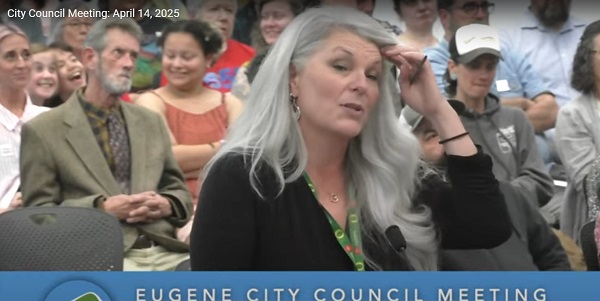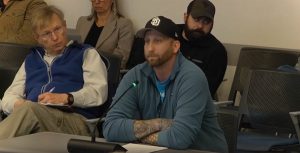City quietly defies Trump administration, approves 19 equity statements
6 min read
Presenter: The city of Eugene Monday night completed its multiyear effort to require equity statements in all neighborhood association charters. All 19 active NAs now oppose discrimination, condemn bias, and advocate for an equitable and welcoming neighborhood.
Although the effort began in 2022 and was repeatedly delayed, its appearance on the agenda this week allowed the council to quietly take a stand in defiance of the Trump administration’s attacks on DEI programs. On April 14, Councilor Jennifer Yeh:
Councilor Jennifer Yeh: I noticed reading through them that there was a lot of similarity but a little bit of variety, especially around membership issues, so I just wanted to ask, I mean, I saw anywhere from one went as low as 10 years to most of them are above 18 (years old).
And then there were also some differences in whether employees of organizations or even businesses—I noticed my own neighborhood association has a new charter in businesses, and I’m not saying any of these are better or worse, I’m just wondering the thought behind not being more consistent in this, I mean, I assume it’s because different neighborhoods are different.
[00:01:09] Presenter: From the city’s Office of Equity and Community Engagement, Cindy Koehler:
[00:01:14] Cindy Koehler: Thank you, thank you. And I always welcome the opportunity to talk about the neighborhood associations, they’re amazing.
[00:01:20] The previously approved charters were designed by the neighborhood associations and approved, some going back to the ‘70s. Our requirements are that all neighborhood associations at the minimum have residents, property owners, age of 18 or older, are part of the membership.
But the neighborhood associations can include other groups. So some include nonprofits, some include businesses, some include employees of the businesses, and that’s really at their discretion. So we’ve left that at their discretion.
[00:01:48] Councilor Jennifer Yeh: Okay, so businesses are an optional add-on, essentially.
[00:01:51] Okay, the only other question is: I know that some neighborhood associations are providing virtual access to their members. At least I know for the Northeast Neighbors that I attend, it’s quite amazing and everything is done and members are even able to ask questions. And they take voting from both in-house and folks that are virtual.
[00:02:12] But I’m not sure if that’s everyone and I’m wondering: If you allow virtual access to your meetings, do we require neighborhood associations to provide participation to those members?
[00:02:27] I know they’re not required to have virtual, but if they provide it, are they required to then let those members participate in the meeting? ‘Cause I noticed one of the charters had a thing under membership that you are considered a member if you sign into this thing. And so I don’t, maybe they don’t do virtual, but I thought that’s kind of a barrier there ’cause that would mean all the people, if they were virtual, would not be able to.
[00:02:50] Cindy Koehler: They’re very creative and they’re very inclusive. I mean, they really are. On one of the neighborhood associations, they also require for voting, you have to attend a meeting in the last 12 months. So they, as people come into the meeting virtually, they do virtually sign in and they get added to the list and they use that list to check for voting.
[00:03:10] Councilor Jennifer Yeh: Okay, so do we require neighborhoods to allow participation if they’re providing a virtual component?
[00:03:17] Cindy Koehler: We haven’t actually had that conversation because it hasn’t come up as an issue from any of the neighborhood associations. Those that do have virtual options—and we provide all the tools, we provide the equipment and the training and the support for them to hold their virtual meetings. And those that do have virtual meetings, those that attend virtually do actively participate.
[00:03:37] Councilor Jennifer Yeh: They’re already taking care of it. (Yep.). Excellent. Thank you, Cindy. I really appreciate it.
[00:03:41] Cindy Koehler: You bet, you bet, thank you.
[00:03:43] Presenter: Mayor Kaarin Knudson:
[00:03:45] Kaarin Knudson (Eugene, mayor): Any other questions or discussion from Council? Thank you, staff. With that, make sure—oh, Councilor Keating, sorry, that little tiny yellow hand. Please.
[00:03:55] Presenter: Councilor Matt Keating:
[00:03:57] Councilor Matt Keating: Thank you, Mayor. A question about e-communication: Are there guidelines established by the city and/or policies? And similar to Councilor Yeh’s line of questioning: Are there similarities or stark differences in the neighborhood associations’ respective ability to communicate broadly with constituents via email?
[00:04:20] Are there some that are on the no-fly list? Is it kind of a free-for-all in allowing for neighborhood associations to use whatever platform, MailChimp, et cetera, that works for them? How secure? I’ll leave it at that. I’m just curious about the neighborhood association’s ability to communicate broadly.
[00:04:39] Presenter: Cindy Koehler:
[00:04:40] Cindy Koehler: We do encourage electronic newsletters. Those are a really great and relatively inexpensive way to communicate with the neighborhood associations. I can’t think of a single neighborhood that does not have electronic communications.
[00:04:53] So we do support iContact, MailChimp, some just send out an email to their communities, to their membership. So we encourage that. We encourage collecting email addresses at their meetings, through their printed publications, through their websites.
[00:05:13] We encourage the neighborhoods to communicate broadly using all sorts of forums—social media, electronic emails, printed publications, posters, flyers, conversations in the grocery store. And we do support and offer training for a lot of that work as well.
[00:05:30] Presenter: With a follow-up question, Councilor Matt Keating:
[00:05:33] Councilor Matt Keating: This concerns the cost associated with some of these platforms. I trust that for parity purposes we’re distributing resources in a fashion that’s equitable to support that outreach effort, (A), and (B): It’s my understanding that neighborhood associations are a function of the municipality. And some operate a little more strictly to like Robert’s Rules of Order, et cetera. Are those emails subject to public meetings laws?
[00:06:03] Presenter: City Attorney Kathryn Brotherton:
[00:06:05] Kathryn Brotherton (Eugene, city attorney): No. The answer is no.
[00:06:07] Presenter: Cindy Koehler:
[00:06:08] Cindy Koehler: We operate under the understanding that while there is an expectation that they operate in the interest of public meetings laws and all of the things that we operate under, but it’s the spirit of the law, they’re not actually required to follow—
[00:06:23] Councilor Matt Keating: Right. Am I accurate in my assessment that they are a function of the municipality though?
[00:06:30] Cindy Koehler: They are an integral part of our public engagement process. The neighborhood associations are a conduit of information and they’re also a way for us to collect information from the community. So they are an integral piece of our community engagement process.
[00:06:4] Presenter: City Attorney Kathryn Brotherton:
[00:06:46] Kathryn Brotherton (Eugene, city attorney): Councilor Keating, I want to just make sure that you have a clear answer to your question regarding whether the neighborhood associations are a functional component of the city: They are not.
[00:06:57] So what Cindy was speaking of is that they help with getting community engagement, but they are not an arm of the city. They are not part of the city. It’s one of the key reasons why they have no public meetings, public records, a lot of requirements, and all that stuff.
[00:07:12] Presenter: Eugene City Council quietly defies the Trump Administration Monday night, approving 19 neighborhood charters amended to include a city-required equity statement.
[00:07:24] Although the neighborhoods are now officially equitable and welcoming, we’ll just have to take their word for it. The city attorney says neighborhoods aren’t subject to public records laws.






